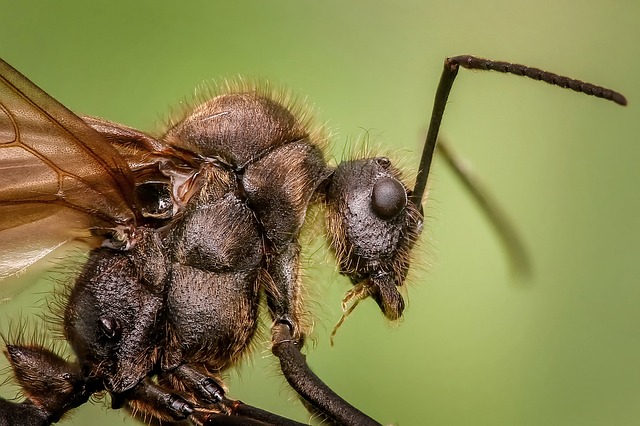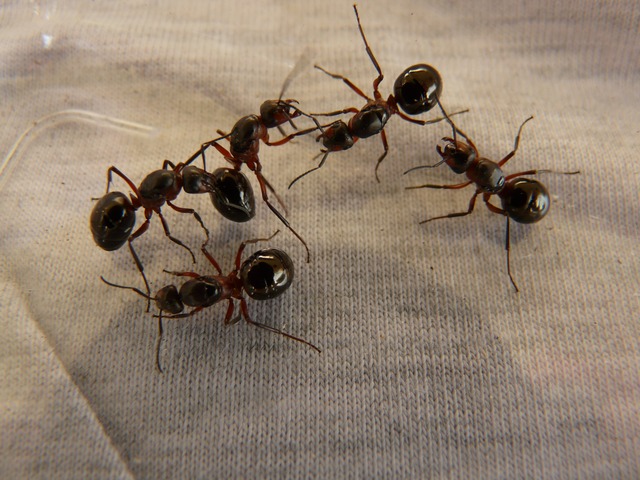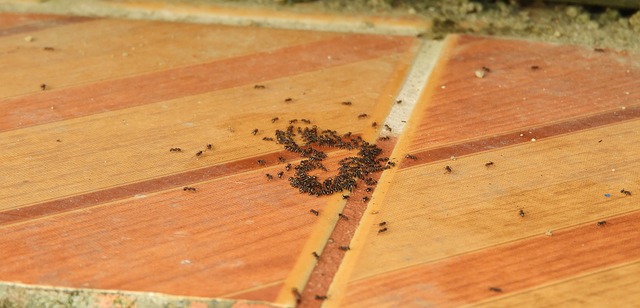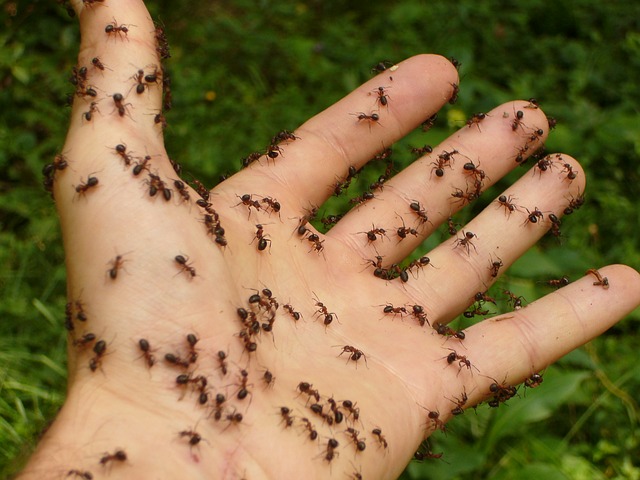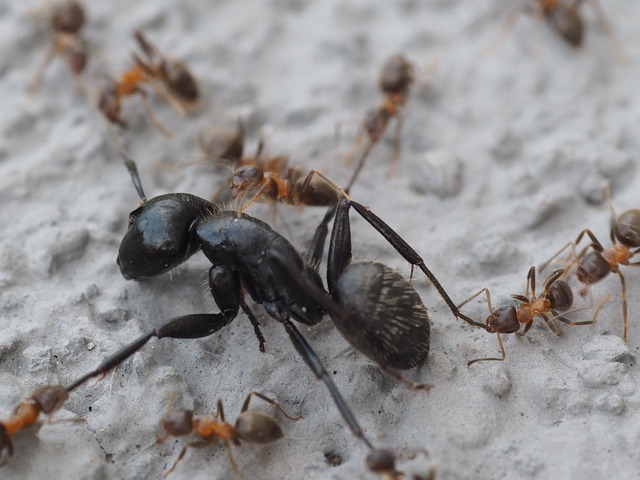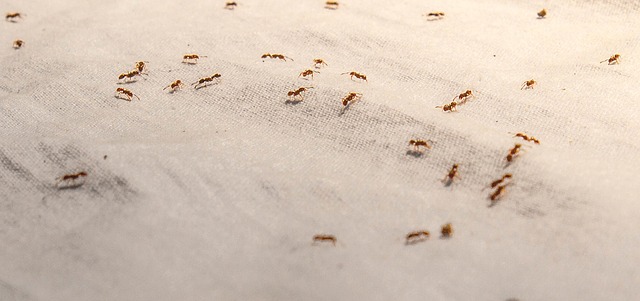What Attracts Ants and How Do I Get Rid of Them?
While ants are fascinating creatures that play an important ecological role through soil aeration and organic recycling, they are not something you want trudging through your home. The typical garden or black ant in the UK live in colonies dominated by the queen ant dedicated to egg production, which can live for up to thirty years.
As the weather starts to warm up in spring, the worker ants that make up the vast majority of the colony begin to forage for food. Initially just a few scouts will leave the nest on this errand, yet this is the starting point of potential problems with ants intruding into houses.
What attracts ants inside the home?
When ants forage for food nowhere is out of bounds in their quest. They will scavenge a wide range of foods, but have a particular liking for sugary substances. This is where the home becomes vulnerable, as anything from a small spillage of juice to a slice of cake left on the side will attract ants.
It does not take much sugar content to bring them in. While foraging, an ant also leaves a scent trail that not only helps them find their way back to the nest, but also helps other foragers follow the trail in the other direction. So the sight of a single ant in the house can be the prelude to many more visitors.
How do ants get into the home?
By the very nature of their size ants do not need much of a gap to be able to get into a house for food or just to shelter. Apart from if you have left the back door open, ants will get in through slight cracks in the foundation, gaps under the doors, or poorly sealed windows.
It is extremely difficult to keep ants out, but some general maintenance such as sealing cracks and crevices in doors and window frames at least reduces some of the entry points. The best way to keep them out though is to try to eliminate the causes that attract them in the first place.
Preventing an ant invasion
Preventative means are probably the best way to stop ants intruding into the home. Keeping a clean house, cleaning up any spills straight away, and cleaning down food preparation areas will help. Remove any rotten fruit or vegetables, and keep sugar based products such as jams and cakes out of reach in sealed containers. Natural products such as salt, turmeric powder or paprika sprinkled around known points of entry can deter ants.
Once the ants are inside, however, scooping them up and putting them out, or killing them on the spot, will unlikely put an end to more visitors coming due to the scent trails already laid. However you choose to remove the ants, the area where they have been will need to be cleaned thoroughly with a strong soap or window cleaner to remove the scent trail.
Household insecticides can be applied around the entry points, and also around the nest in the garden if located. Yet with the sheer quantity of ants and the low dosages of these insecticides this may well prove to be a short term solution. For serious ant problems, a professional pest controller should be used.
FAQs: Are ants harmful?
Are ants harmful?
Ants that reside in the UK are pretty much harmless. Ants that are found in the garden or black in colour will not bite and do not carry disease. However, ants that have found their way into your home may have journeyed through grimy places and can spread contamination throughout your living areas.
Are ants dangerous?
Ants in the UK are not seen as a threat and can, in fact, kill other pests such as flies and fleas.
Are ants dirty?
Because ants do not come alone and travel in their masses, they can find their way into the smallest of spaces and although ants are generally not dirty, their bodies can pick up dirt along the way.
Are ants poisonous?
Ants found in the UK are not poisonous. They may bite and sting but they are harmless to humans.
Which ants are dangerous?
Types of dangerous ants across the world include:
- Bulldog Ant (Australia)
- Pony Ant (Africa)
- Siafu Ant (Africa)
- Fire Ant (South America)
- Bullet Ant (South America)
Why ants are bad?
Ants can ruin the foundations of a home and cause a lot of damage.
FAQs: Why are ants in my house/bathroom/kitchen?
Why ants are everywhere?
Ants are attracted to any type of food source, so if your kitchen tops are dirty or there’s ready available fruit, sweets or crumbs – they will find their way to it. Ant colonies can consist of thousands or millions of tiny ants, which is why they seem to be everywhere, once you’ve found your first ant.
Where do ants come from?
Ants are on a constant search for a good food source.
Where do ants enter the house?
Ants can enter your home in various ways including under slabs, through cracks and floorboards.
How to find the source of ants
Watch the ant trail and follow the direction they are coming from to find out where they are entering your home.
FAQs: Which ants do I have in my house?
Which ants do I have in my house?
If you have ants in your home, the chances are they are Carpenter Ants, Pavement Ants, Thief Ants or Odorous House Ants. These are all home-dwellers that enjoy the food supply that’s kept within the home.
Which ants do I have?
- Carpenter Ants: are dark brown/black in colour and can be found in and around door and window frames, as they like to make a nest in rotting wood. They don’t cause much damage but they will cause the wood to rot quicker.
- Pavement Ants: named for where they reside, these ants nest under pavements and rocks nearby homes and come searching inside for local produce. You’re likely to find these ants around any greasy food remnants or anything sugary during spring and summer. They’re also known for making a home for themselves in your basement too.
- Thief Ants: these are the smallest of ants, they are light yellow in colour with hints of black in the middle. These ants tend to nest near other types of ants and they are called Thief Ants because they will steal from other nests in order to feed. Thief Ants prefer to feed on dead insects and greasy food rather than sugary treats.
- Ants with wings: some Carpenter Ants have wings and can fly; those that do are either male or queens. If you happen to find ants with wings inside your home, it’s likely that there is a nest inside the property. They can appear even in the winter and are usually found within the structure of the building.
- Ants with stingers: Fire Ants have stingers on their rear end and in the UK, although they’re not harmful, they can cause itching and an unpleasant feeling.
FAQs: How to get rid of ants
How to kill ants without poison
- Firstly, watch the ants and their movements, take note of their trails. This way you will be able to see the location in which they’re entering.
- Avoid the urge to get rid of the ants you can see immediately because unfortunately, the queen will only produce more eggs – so your problem will keep returning.
- Try using ‘ant bait’ and place this along the ant trail.
- Stop cleaning the ant contaminated area for a period of time and use the food source that they’re finding their way to, to destroy them. This will lead them along the same trail and to the bait – so whilst the queen keeps producing more and more ants – they will all follow the same route and be effectively removed.
- Once the ants have come to and from the ant bait contaminated with the insecticide, a high quantity of this will end back up in the nest and thus, destroy the entire nest. This process can take around a week but it is a very successful method.
- Afterwards, clean up and seal any gaps around windows or doors.
How to kill ants without Borax or other chemicals
Or, how to kill ants without harming pets:
- Vinegar mixed with water: wipe your floors and surfaces with this solution and this should deter a colony of ants.
- Boiling water: pouring boiling water into an ants nest.
- Peppermint: wiping this around any entrances the ants use to get inside your home can put a stop to the problem.
- Hire pest experts: if you’re unsure about getting rid of ants, you can always contact the professionals who will put a stop to your problem.
- Pour cornmeal around the ant’s nest: the ants will eat this and perish when their stomachs expand.
- Grow fresh mint – ants will avoid your home and garden because they don’t like the smell of mint and this will go unnoticed by pets.
Pest Defence are experts in providing safe, efficient solutions to your pest problems, including invasions of ants and other insects. If you would like to know more about what we do, please feel free to get in touch with us today.

